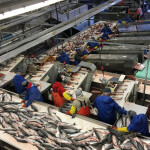A new study claims that farmed fish may be able to contract mad cow disease if fed cow byproducts. The study was led by University of Louisville neurologist Robert Friedland, M.D., and published in the June issue of the Journal of Alzheimer’s Disease.
The risk of transmitting mad cow disease, or bovine spongiform encephalopathy (BSE), from fish to humans is “low,” acknowledged the researchers.
“We have not proven that it’s possible for fish to transmit the disease to humans,” said Friedland. “Still, we believe that out of reasonable caution for public health, the practice of feeding rendered cows to fish should be prohibited. Fish do very well in the seas without eating cows.”
“The fact that no cases of [mad cow] disease have been linked to eating farmed fish does not assure that feeding rendered cow parts to fish is safe,” he added. “The incubation period of these diseases may last for decades, which makes the association between feeding practices and infection difficult. Enhanced safeguards need to be put in place to protect the public.”
Mad cow disease, also called Creutzfeldt Jakob disease, is fatal and can be contracted by eating parts of an animal infected with BSE. There have been 163 deaths from Creutzfeldt Jakob disease in the United Kingdom attributed to eating infected beef. BSE has been identified in nine Canadian and three U.S. cattle.
Most countries, including the United States, ban the practice of feeding cow byproducts to other cows because the disease spreads easily within the same species.
University of Mississippi researchers said in late 2007 that some U.S. fish-feed manufacturers have voluntarily discontinued the use of meat and bone meal.
Back to home >




